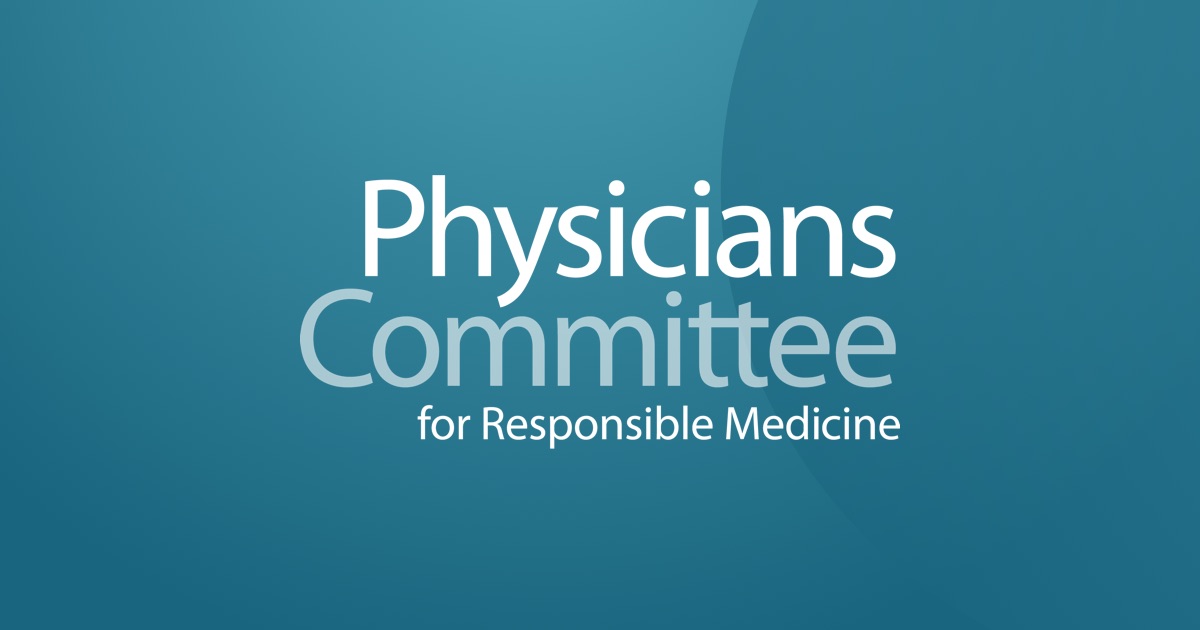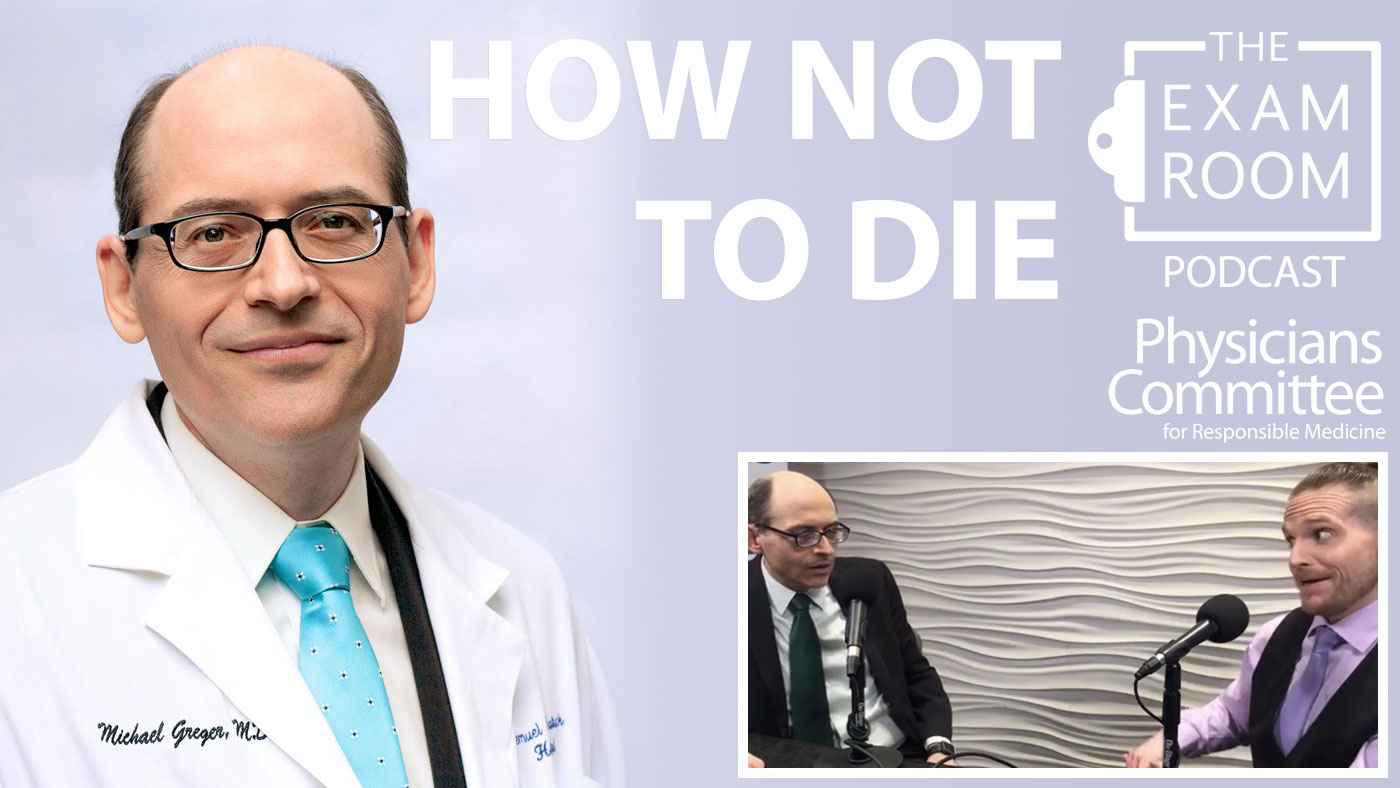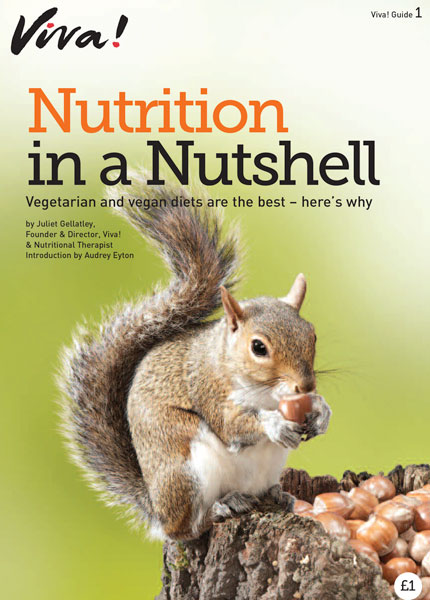- Joined
- Mar 1, 2016
- Reaction score
- 196
- Age
- 65
- Lifestyle
- Vegan
Vegan Nutrition References.
Links online and books of use to learn about nutrition aspects of veganism.
1. PCRM Website and books.

 www.pcrm.org
www.pcrm.org

 www.pcrm.org
www.pcrm.org
This is how not to die!
The number one cause of death and disease in the United States is diet, but life and death decisions should not be a lottery!
Subscribe: subscribe to the exam room on Google play
subscribe to the exam room on stitcher Spotify
Michael Greger, M.D., of NutritionFacts.org, joins “The Weight Loss Champion” Chuck Carroll to show you how to change your fortunes by changing your diet and lowering your risk of death from preventable, diet-related conditions.
Dr. Greger also discusses how you can break your food addiction and what got you hooked on food to begin with!
Plus, Dr. Greger takes your questions on nutrition.
The episode was taped on location at the International Conference on Nutrition in Medicine in Washington, D.C., and streamed live on Facebook.
In This Episode
Lowering your risk of dying from the leading causes of death
Why you’re addicted to food and how to break it
Are whole plant foods healthier than processed vegan foods?
The foods we should be eating every day
The effect of natural peanut butter on triglycerides
The best way to transition to a plant-based diet
How to burn fat on a diet based on carbs
The healthiest plant-based milk
Which is the healthier form of vitamin B12: cyanocobalamin or methylcobalamin?
Meat alternatives
PCRM is a huge collection of nutritional experts very influencial in the USA. People's Committee for Responsible Medicine.
2. VIVA UKVegan organisation.
 viva.org.uk
viva.org.uk
A varied diet based on the foods in the table below ensures adequate intake of all essential nutrients and many more beneficial ones such as antioxidants. A healthy vegan diet is one consisting mainly of fruit and vegetables, pulses, wholegrains and nuts and seeds. It provides the body with all it needs and the only vitamin required to be supplemented is vitamin B12. It can be taken either in the form of food supplements or enriched foods, such as plant milks or margarines. B12 supplementation is not only recommended to vegans but to everyone over the age of 50, regardless of the diet, as the body’s ability to absorb this vitamin declines with age.
Over the winter months, vitamin D supplementation is also recommended to everyone in the UK. Not all vitamin D is vegan though – vitamin D2 is and some vitamin D3 can be too but make sure you know the source (most vitamin D3 is animal derived).
To ensure sufficient intake of essential omega-3 fats, natural sources should be made part of a daily diet – milled flaxseed (linseed) or hempseed and their oils for cold food preparation, rapeseed oil for cooking and some nuts and seeds as a healthy addition to meals – eg walnuts and chia seeds.
Nutrition status of vegetarians and vegans
There are many recent studies analysing the diet composition and nutrient intakes of vegetarians and vegans from across the world:
In the most recent one, vegan, vegetarian, semi-vegetarian, pesco-vegetarian and omnivore diets were studied and compared in Belgium (Clarys et al., 2014). Vegans had the healthiest weight among all groups and received the highest score on the healthy eating scale (measured by two different ranking systems). The higher the score, the healthier the diet and the lower the risk of a number of chronic and lifestyle related diseases. The fat intake of the vegan group was better (more unsaturated healthy fats and less saturated fats) than in the other groups and they were also found to consume the most fibre and iron. Calcium intake was lower than in the other dietary patterns but still above the UK recommended dose (700 mg). Vegan protein intake was more than sufficient, whilst in meat eaters it reached almost twice the recommended intake levels, which has been shown to have negative health effects.
A similar study comparing various dietary patterns (omnivore, semi-vegetarian, pesco-vegetarian, lacto-ovo vegetarian and vegan) in the US and Canada brought similar results (Rizzo et al., 2013). Vegans had the healthiest body weights, the highest intake of fibre and the lowest fat intake. The overall fat intake of vegans was healthier than in the other groups – they ate the least saturated and trans fats. The vegan group was found to have more than sufficient intakes of protein, vitamins and minerals (including calcium and iron above recommended intake). Based on the findings, the study authors suggested that the health protective effects of plant-based diets can be ascribed to the generally healthier profile of vegetarian diets.
When Davey et al. (2003) analysed food intakes of British vegans, vegetarians and meat-eaters, their findings were in line with the above. Vegans had the lowest intake of saturated fats and the highest intakes of fibre, vitamin B1, folate, vitamin C, vitamin E, magnesium and iron. The only mineral that was slightly below the recommended intake in some vegans was calcium but overall, vegans showed to have adequate intakes of all essential nutrients and had the healthiest fat intake profile (the least saturated and the most unsaturated fats). The healthfulness of vegan diets was also confirmed by a later study of UK population in which vegan diets had the best nutrient profiles of all diet groups, including the lowest fat and the highest fibre intakes (Key et al., 2014).
Orlich et al. (2014) looked at vegetarian and non-vegetarian diets more closely to assess the main differences. They found that vegans eat the most fruit, vegetables, soya and soya products, grains, pulses, nuts and seeds; and the least sweets, fizzy drinks, fried potatoes, refined cereals and added fats. Overall, vegetarian diets, and especially vegan ones, had much healthier patterns than omnivorous diets reflecting that plant-based diets are not based simply on exclusion of animal products but lead to a higher quality diet.
For more information on nutrients, their importance and best vegan sources see our exclusive new resource:
A-Z of Nutrients

 viva.org.uk
viva.org.uk
Nutrition In A Nutshell
Nutrition in a Nutshell
A handy guide showing you how healthy and nutritious a plant-based diet is. Your questions about protein, iron and calcium answered here! Includes a vitamin chart and where to obtain all the nutrients you need on a vegetarian or vegan diet.
Written by Juliet Gellatley, Founder & Director, Viva! and Nutritional Therapist. Introduction by Audrey Eyton, author of the F Plan Diet and F2 Diet.
This post has been categorised in: All Print Materials, Guides
Links online and books of use to learn about nutrition aspects of veganism.
1. PCRM Website and books.

Physicians Committee for Responsible Medicine
The Physicians Committee for Responsible Medicine is a nonprofit health organization that promotes preventive medicine, conducts clinical research, and encourages higher standards for ethics and effectiveness in research and medical training.The Carbohydrate Advantage
Choose Complex Carbohydrates for Lasting Energy and Good HealthFiber
Fill Up on 40 Grams of Fiber a DayOmega-3 Fatty Acids and Plant-Based Diets
Get omega-3s with ease on a plant-based diet!Protein
Power Up With Plant-Based ProteinSoy and Health
Lowering Cholesterol With a Plant-Based Diet
Health Concerns About Dairy
Avoid the Dangers of Dairy With a Plant-Based DietHealth Concerns With Eggs
Eating Eggs Can Be Hazardous to Your HealthProcessed Meat
There Is No Safe Amount of Processed MeatAdherence to Healthful Plant-Based Diets Associated With Lower Risk for Type 2 Diabetes

How Not To Die
This is how not to die! The number one cause of death and disease in the United States is diet, but life and death decisions should not be a lottery!This is how not to die!
The number one cause of death and disease in the United States is diet, but life and death decisions should not be a lottery!
Subscribe: subscribe to the exam room on Google play
subscribe to the exam room on stitcher Spotify
Michael Greger, M.D., of NutritionFacts.org, joins “The Weight Loss Champion” Chuck Carroll to show you how to change your fortunes by changing your diet and lowering your risk of death from preventable, diet-related conditions.
Dr. Greger also discusses how you can break your food addiction and what got you hooked on food to begin with!
Plus, Dr. Greger takes your questions on nutrition.
The episode was taped on location at the International Conference on Nutrition in Medicine in Washington, D.C., and streamed live on Facebook.
In This Episode
Lowering your risk of dying from the leading causes of death
Why you’re addicted to food and how to break it
Are whole plant foods healthier than processed vegan foods?
The foods we should be eating every day
The effect of natural peanut butter on triglycerides
The best way to transition to a plant-based diet
How to burn fat on a diet based on carbs
The healthiest plant-based milk
Which is the healthier form of vitamin B12: cyanocobalamin or methylcobalamin?
Meat alternatives
PCRM is a huge collection of nutritional experts very influencial in the USA. People's Committee for Responsible Medicine.
2. VIVA UKVegan organisation.
Vegan nutrition | Viva! - The Vegan Charity
A varied diet based on the foods in the table below ensures adequate intake of all essential nutrients and many more beneficial ones such as antioxidants.
A varied diet based on the foods in the table below ensures adequate intake of all essential nutrients and many more beneficial ones such as antioxidants. A healthy vegan diet is one consisting mainly of fruit and vegetables, pulses, wholegrains and nuts and seeds. It provides the body with all it needs and the only vitamin required to be supplemented is vitamin B12. It can be taken either in the form of food supplements or enriched foods, such as plant milks or margarines. B12 supplementation is not only recommended to vegans but to everyone over the age of 50, regardless of the diet, as the body’s ability to absorb this vitamin declines with age.
Over the winter months, vitamin D supplementation is also recommended to everyone in the UK. Not all vitamin D is vegan though – vitamin D2 is and some vitamin D3 can be too but make sure you know the source (most vitamin D3 is animal derived).
To ensure sufficient intake of essential omega-3 fats, natural sources should be made part of a daily diet – milled flaxseed (linseed) or hempseed and their oils for cold food preparation, rapeseed oil for cooking and some nuts and seeds as a healthy addition to meals – eg walnuts and chia seeds.
Nutrition status of vegetarians and vegans
There are many recent studies analysing the diet composition and nutrient intakes of vegetarians and vegans from across the world:
In the most recent one, vegan, vegetarian, semi-vegetarian, pesco-vegetarian and omnivore diets were studied and compared in Belgium (Clarys et al., 2014). Vegans had the healthiest weight among all groups and received the highest score on the healthy eating scale (measured by two different ranking systems). The higher the score, the healthier the diet and the lower the risk of a number of chronic and lifestyle related diseases. The fat intake of the vegan group was better (more unsaturated healthy fats and less saturated fats) than in the other groups and they were also found to consume the most fibre and iron. Calcium intake was lower than in the other dietary patterns but still above the UK recommended dose (700 mg). Vegan protein intake was more than sufficient, whilst in meat eaters it reached almost twice the recommended intake levels, which has been shown to have negative health effects.
A similar study comparing various dietary patterns (omnivore, semi-vegetarian, pesco-vegetarian, lacto-ovo vegetarian and vegan) in the US and Canada brought similar results (Rizzo et al., 2013). Vegans had the healthiest body weights, the highest intake of fibre and the lowest fat intake. The overall fat intake of vegans was healthier than in the other groups – they ate the least saturated and trans fats. The vegan group was found to have more than sufficient intakes of protein, vitamins and minerals (including calcium and iron above recommended intake). Based on the findings, the study authors suggested that the health protective effects of plant-based diets can be ascribed to the generally healthier profile of vegetarian diets.
When Davey et al. (2003) analysed food intakes of British vegans, vegetarians and meat-eaters, their findings were in line with the above. Vegans had the lowest intake of saturated fats and the highest intakes of fibre, vitamin B1, folate, vitamin C, vitamin E, magnesium and iron. The only mineral that was slightly below the recommended intake in some vegans was calcium but overall, vegans showed to have adequate intakes of all essential nutrients and had the healthiest fat intake profile (the least saturated and the most unsaturated fats). The healthfulness of vegan diets was also confirmed by a later study of UK population in which vegan diets had the best nutrient profiles of all diet groups, including the lowest fat and the highest fibre intakes (Key et al., 2014).
Orlich et al. (2014) looked at vegetarian and non-vegetarian diets more closely to assess the main differences. They found that vegans eat the most fruit, vegetables, soya and soya products, grains, pulses, nuts and seeds; and the least sweets, fizzy drinks, fried potatoes, refined cereals and added fats. Overall, vegetarian diets, and especially vegan ones, had much healthier patterns than omnivorous diets reflecting that plant-based diets are not based simply on exclusion of animal products but lead to a higher quality diet.
For more information on nutrients, their importance and best vegan sources see our exclusive new resource:
A-Z of Nutrients

Nutrition In A Nutshell — | Viva! - The Vegan Charity
A handy guide showing you how healthy and nutritious a plant-based diet is. Your questions about protein, iron and calcium answered here!
Nutrition In A Nutshell
Nutrition in a Nutshell
A handy guide showing you how healthy and nutritious a plant-based diet is. Your questions about protein, iron and calcium answered here! Includes a vitamin chart and where to obtain all the nutrients you need on a vegetarian or vegan diet.
Written by Juliet Gellatley, Founder & Director, Viva! and Nutritional Therapist. Introduction by Audrey Eyton, author of the F Plan Diet and F2 Diet.
This post has been categorised in: All Print Materials, Guides


